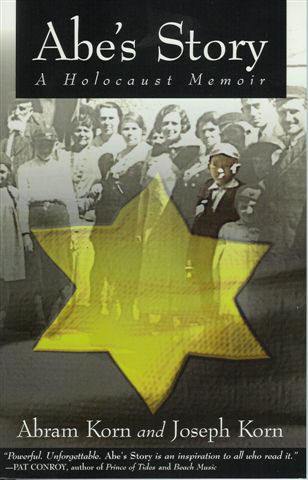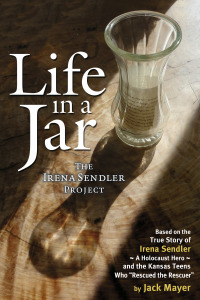FINGERPRINTS
by:
Hannah Towne
“Ill forgive and Ill forgetbut Ill remember” (?). Six million Jews were killed during the Holocaust and thousands of others had their lives drastically altered or destroyed. It is these survivors that we must listen to and learn from, for in this capacity, they also speak for the dead. They were destroyed as a whole, as a statistic, but can only be resurrected as individuals. Each tear, each drop of blood, each moment of grief, must be appreciated for its worththe value of a life. The feelings of horror, hopelessness, and confusion were not unique. It was the people feeling these emotions that were unique. Simon Wiesenthal asks if forgiveness is possible. I would not forgive, but forgiveness is very individualas individual as our fingerprints.
For Karl to ask Simon for forgiveness just because he was a Jew and to assume that all Jews are the same is like saying all our planets are the same because they are all in the Milky Way Galaxy. You and I are not the same so why should the Holocaust victims be any different? Simon, Arthur and Josek are not the same person and Simon shares some of these differences when he tells stories of Arthur having a pessimistic attitude and of Josek being very religious and more of an optimist in his outlook towards their fate (Wiesenthal 5). The Holocaust was a tragedy that affected each individual that experienced it. Karl made the assumption that he could just say he was sorry to one Jew and everything would be all right and it would all just seem like a bad nightmare. Simon, in his actions, reminded Karl that it was real and saying sorry didnt cut it.
Life and death are very personal things. It is journey that can only truly be experienced by the individual. It is for this reason that I believe only the individual can be responsible for his or her existence in its entirety and any decision regarding this existence can only be made by that individual. Simon cannot forgive Karl for his wrongs because those wrongs were not committed against Simon and Karl should not have put this responsibility upon Simon. Forgiveness is an individual choice and like a fingerprint, only belongs to that individual.
To forgive is an act of superhuman goodness (Konig 183) and this act could allow Simon to rise above the evils of the Nazis and to become something greater. Forgiving Karl would set Simon free. It would set him free from anger, resentment, and the thoughts of a missed opportunity (183). In order for the world to move on and away from this tragedy, individual people must take the first steps. “More value would grow out of forgiveness that out of its withholding” (Marty 211). If Simon ever feels the need to be set free, he may do so by forgiving Karl for the acts committed against him. Simon can forgive Karl as a representative for all the Nazis who had committed evil acts upon Simons existence. It is these Nazis, and only these Nazis, that Simon has a right to forgive. Simon could set himself free without interfering with anyone elses peace or justice. Simon and other Jews should not be forced to forgive (Fisher 132). Time heals many wounds and eventually peace can be found within. Once they have come to terms with the events of their lives, then they may be able to bring themselves to forgive the Nazis. No one else was there, no one else suffered with them, so the right and choice to forgive should be left to the Jews (132).
My sense of justice has changed as I have aged. Five years ago I probably would have forgiven Karl because I felt that people are born good and arent truly evil. I also felt that everyone deserved a second chance and that I would get over my angry feelings so I should just forgive Karl while I had the chance. However, after being in the Army, my views have changed drastically. The Army breeds excessive frustration and such a negative environment that anger arises quickly and only intensifies. It has almost been a year now since I got out, but the brick of anger is firmly planted at the pit of my existence. All I can do is try to forget and move on. I am no longer an angry person and havent been mad since, but forgiveness is no longer possible and there is no way I could ever forgive Karl.
What Karl did was inexcusable and unforgivable. Karl didnt accidentally hit a person with his car, he shot them. He burned them and shot them and kept doing it. He didnt seem to think his actions were bad enough to stop and he could have–without punishment (Rubenstein 239). So why was Karl asking for forgiveness now? Was it because he was on his deathbed and afraid of going to hell because he knew he was guilty? Or because he felt sorry for himself for being too young, in pain, away from his mother whom he had treated so poorly? Karls ploy to drag Simon down with him deemed him even more unworthy of forgiveness (Hertzberg 166). If Karl was truly remorseful, he would have summoned a priest because only a priest could have forgiven him. Karl new this from his childhood so I believe that he was afraid to speak to a priest because he would have to lie or be forced to actually take responsibility for his actions. I would choose to try and forget because forgetting and forgiving are two very different things (Fox 148) and the latter I would refuse.
I do not feel that I am being too harsh towards Karl because even though I wasnt there, I could have been and I could be in the future. If we could predict the future, we could prevent these evils from occurring, but we cant. Who says that I wont be included in the next group? A clear message must be sent out that this evil behavior will not be tolerated and will be severely punishedby individuals, the world, and God. An example must be set because just like misbehaving children, they will continue to misbehave until they realize what they are doing is wrong and must stop or they learn that their actions will not be tolerated and they will be punished. If I know I can get away with something without getting in trouble, Im going to keep doing it without regret. If the stakes are raised and there is a possibility of punishment by being shamed the rest of my life, by being unforgiven, by death, or going to hell for my actions, I would strongly feel the urge to change my behavior.
Most of the world is religious so it is very important to emphasize that God cant or wont always be forgiving. Judaism believes that the wrongdoer must seek atonement from the individual before God will forgive (Lipstadt 194). Truly religious people will know that God isnt all forgiving and it isnt all that easy to “get away with murder.” This strong urge to be “good” must overwhelm evildoers and deter them from their path onto the path of the righteous.
Simon and the others deserve justice. It was just the thought of this justice that kept many, like Josek, filled with hope throughout their days of misery. How would I feel in a situation like this? I really dont want to find out, so I must do everything in my power to make sure these evils never rear their ugly heads againfor my sake and for yours.
WORKS CITED
Fisher, Eugene J. “Response.” The Sunflower. New York: Schocken Books, 1998. 130-35.
Fox, Matthew. “Response.” The Sunflower. New York: Schocken Books, 1998. 143-48.
Hertzberg, Arthur. “Response.” The Sunflower. New York: Schocken Books, 1998. 166-68.
Konig, Franz. “Response.” The Sunflower. New York: Schocken Books, 1998. 182-83.
Lipstadt, Deborah E. “Response.” The Sunflower. New York: Schocken Books, 1998. 193-96.
Marty, Martin E. “Response.” The Sunflower. New York: Schocken Books, 1998. 208-13.
Rubenstein, Joshua. “Response.” The Sunflower. New York: Schocken Books, 1998. 237-40.
Wiesenthal, Simon. “The Sunflower.” The Sunflower. New York: Schocken Books, 1998. 3-98.
“?” This quote was from a book of momilies. It was a book of things some famous and not so famous peoples mothers used to say. I dont remember the exact title or author etc.



